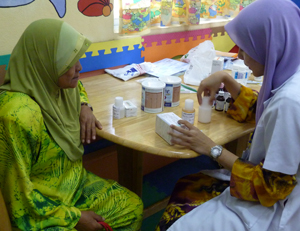The Imperative of Treatment in Asia
TREAT Asia and Partners Move Treatment to Center Stage
July 2011—Even before recent research confirmed the powerful preventive effect of antiretroviral therapy (ART) on HIV transmission, demand for improved and expanded HIV treatment had been escalating around the world. Late last year, the World Health Organization (WHO) released treatment guidelines encouraging physicians to initiate ART far earlier than previously recommended, a target that stands to further intensify demand for anti-AIDS drugs.

A pharmacist in Malaysia explains treatment issues to an HIV-positive child’s caregiver. |
In Asia, the goal of expanding HIV treatment runs head-on into reality. The gap in this region between those who need ART and those who are getting it is among the widest in the world—only 29 percent of the 1.5 million in need are being reached, a figure well below the global average of 37 percent. Drugs to prevent mother-to-child transmission reach just 26 percent of those in need compared with a global average of 45 percent. Complicating the picture are increases in treatment failure and the emergence of resistance to first-line ART drugs.
Acting on the imperative of treatment expansion despite its steep challenges, TREAT Asia and other groups in the region have baded together to form the Asia Treatment Working Group with the aim of promoting treatment access and higher quality HIV healthcare. The Asia-Pacific Network of People Living with HIV/AIDS (APN+), the International Treatment Preparedness Coalition (ITPC), Médecins Sans Frontières–Access Campaign (MSF), and TREAT Asia have launched a series of projects with support from key UN agencies including UNAIDS and UNICEF.
Each organization involved in the Working Group brings its own expertise to the joint endeavor—from TREAT Asia's proficiency with research and APN+'s skill with community mobilization, to ITPC's policy experience and MSF's knowledge of access issues.
One main objective of the partnership is to help implement the new WHO guidelines, which recommend a lower threshold for ART and the use of more potent and effective drugs such as tenofovir for first-line treatment. Currently stavudine (d4T) is the first-line drug of choice in most resource-limited countries because of its low cost, but it presents a host of long-term problems. TREAT Asia has helped make the new WHO guidelines clearer for community groups and activists by developing, translating, and producing community-friendly fact sheets on the revised guidelines that have been translated into seven regional languages with more to come.
| The gap in Asia between those who need treatment and those who are getting it is among the widest in the world. |
|
"Shifting to tenofovir will be a giant step for the region," said Jennifer Ho, TREAT Asia's manager of community programs. "The push is to stop using sub-optimal drug regimens so you don't have to go to second-line. Instead, you invest more up front so you don't have to take the second step. This is what optimizing treatment is—improving the regimen."
Drug access is another important concern for the Working Group, particularly in reference to ongoing global trade negotiations that threaten access to generic antiretroviral drugs. But the availability of medicines can be a local issue as well when it comes to maintaining supply chains to ensure that drugs are in stock when and where patients need them. To analyze treatment access at the community level, the Working Group is creating a database that will track how far people have to travel to get their medicines and whether they are consistently available.
With the aim of expanding interventions to prevent mother-to-child transmission of HIV (PMTCT), the Working Group hosted a regional community forum in Bangkok in April. "This information is highly complex and technical," said Ho, "so it made sense for TREAT Asia to develop the content. We did the same for a previous forum on drug resistance."
The Treatment Working Group is also providing technical support for a six-country survey of maternal and child health, including PMTCT, led by Women of APN+. Preliminary analysis has indicated multiple violations of HIV-positive women's sexual and reproductive health rights and has raised serious concerns regarding the quality of PMTCT across all surveyed countries.
Summarizing the aspirations of the coalition, Ho declared: "It's time to bring the quality of treatment in Asia up to what the Western world has had for 15 years."